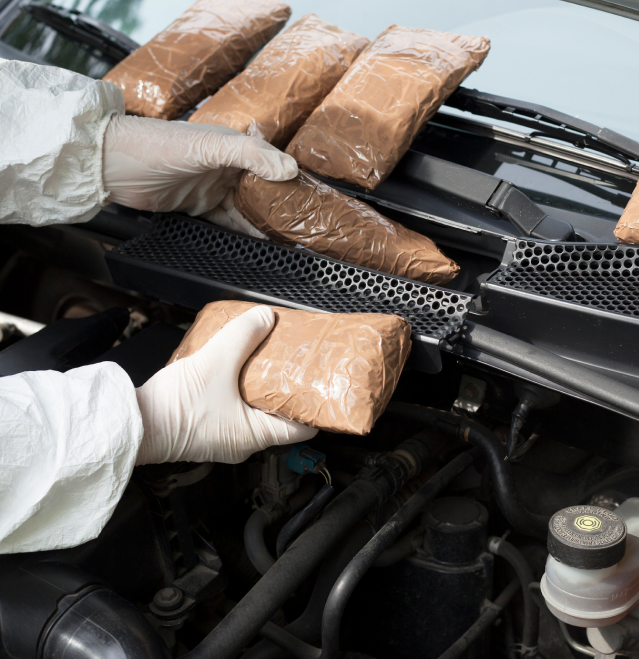
20+
years of experience

100+
5-star reviews

100%
criminal defense
Drug trafficking convictions carry some of the harshest punishments in the state. If you face these charges, it’s essential that you contact a drug trafficking lawyer in North Carolina to build a robust defense strategy. At Hiltzheimer Law Office, our team of experienced criminal defense attorneys can help you effectively fight these serious consequences.
We are dedicated to helping our clients receive the individualized representation they deserve. There is no one-size-fits-all defense when you hire our team. Our years helping people facing both state and federal drug trafficking charges allow us to understand exactly what a conviction would mean for your life, so we’ll work tenaciously to help you.
Contact our team to schedule a consultation today.
What Is Drug Trafficking NCGS § 90-95 in North Carolina?
Drug trafficking laws NCGS 90-95 define drug trafficking as involving the sale, possession, or delivery of a substantial amount of a controlled substance.
Elements of Drug Trafficking in North Carolina
The North Carolina state legislature has drafted our drug trafficking laws broadly, such that the prosecution in many cases will not be required to prove intent or actual trafficking in the conventional sense of the term. Instead, North Carolina law identifies certain quantity thresholds of various drugs that, if proven, amount to trafficking if you are found to be in the mere possession of those quantities. And to make matters worse, if you are convicted of trafficking, you’ll be facing mandatory prison and fines outside of the standard Structured Sentencing grid, regardless of your prior criminal record or lack thereof.
Under North Carolina law, anything above the following quantities — if the State can prove possession and the quantity beyond a reasonable doubt — meets the threshold for drug trafficking:
- Marijuana:
- More than 10 pounds but less than 50 pounds: Class H Felony
- Minimum 25 months incarceration and $5000 fine
- 50 pounds or more but less than 2000 pounds: Class G Felony
- Minimum 35 months incarceration and $10,000 fine
- 2000 pounds or more but less than 10,000 pounds: Class F Felony
- Minimum 70 months incarceration and $50,000 fine
- 10,000 pounds or more: Class D Felony
- Minimum 175 months incarceration and $200,000 fine
- More than 10 pounds but less than 50 pounds: Class H Felony
- Cocaine:
- 28 grams or more but less than 200 grams: Class G Felony
- Minimum 35 months incarceration and $50,000 fine
- 200 grams or more but less than 400 grams: Class F Felony
- Minimum 70 months incarceration and $100,000 fine
- 400 grams or more: Class D Felony
- Minimum 175 months incarceration and $250,000 fine
- 28 grams or more but less than 200 grams: Class G Felony
- Methamphetamine:
- 28 grams or more but less than 200 grams: Class F Felony
- Minimum 70 months incarceration and $50,000
- 200 grams or more but less than 400 grams: Class E Felony
- Minimum 90 months incarceration and $100,000 pounds
- 400 grams or more: Class C Felony
- Minimum 225 months incarceration and $250,000 fine
- 28 grams or more but less than 200 grams: Class F Felony
- Opium, Opiate, or Opioid:
- 4 grams or more but less than 14 grams: Class F Felony
- Minimum 70 months incarceration and $50,000 fine
- 14 grams or more but less than 28 grams: Class E Felony
- Minimum 90 months incarceration and $100,000 fine
- 28 grams or more: Class C Felony
- Minimum 225 months incarceration and $500,000 fine
- 4 grams or more but less than 14 grams: Class F Felony
- LSD:
- 100 or more dosage units but less than 500: Class G Felony
- Minimum 35 months incarceration and $25,000
- 500 or more dosage units but less than 1000: Class F Felony
- Minimum 70 months incarceration and $50,000 fine
- 1000 or more dosage units: Class D Felony
- Minimum 175 months incarceration and $200,000 fine
- 100 or more dosage units but less than 500: Class G Felony
- MDMA/Molly/Ecstasy:
- 100 or more tablets or dosage units but less than 500; or 28 grams or more but less than 200 grams: Class G Felony
- Minimum 35 months incarceration and $25,000
- 500 or more tablets or dosage units but less than 1000; or 200 grams or more but less than 400: Class F Felony
- Minimum 70 months incarceration and $50,000 fine
- 1000 or more tablets or dosage units; or 400 grams or more: Class D Felony
- Minimum 175 months incarceration and $250,000 fine
- 100 or more tablets or dosage units but less than 500; or 28 grams or more but less than 200 grams: Class G Felony
Defending Against Drug Trafficking Charges
When looking for how to get drug trafficking charges dropped, it’s important to first know that fighting your charges is not a task you want to take on by yourself. Instead, you need to hire a drug trafficking lawyer in North Carolina who will prepare a strong defense.
One of the drug trafficking defense options we have is to challenge whether the stop, search, or seizure was lawful. If we can demonstrate that law enforcement had no reason to stop you or that they didn’t have warrants or probable cause to search you, we can potentially get you a lesser sentence.
We can also look at the circumstances surrounding the processing of any evidence gathered at the scene. For example, the evidence might not have been handled correctly, or the lab that processed it may not be reliable.
If the prosecutor can’t prove that you knowingly possessed the controlled substance, we can also use that in your defense. In the case of marijuana, in light of new laws legalizing Delta-8 and other cannabinoids derived from hemp, a skilled attorney can challenge the state’s ability to prove that the substance was, in fact, marijuana as opposed to a legal derivative of the hemp plant.

Key Factors in a Drug Trafficking Case
Under North Carolina drug trafficking laws, the prosecution has to prove that you were in possession of a certain quantity of a scheduled controlled substance and that you sold or intended to sell the drug. Proving felony drug possession charges can be relatively simple for the state depending on the circumstances, but intent to distribute requires a higher level of proof.
If the state can’t prove that you had the intent to sell or that you sold the controlled substance, then it may be possible to fight your case at trial or negotiate a reduced charge. To increase your odds of avoiding the most serious consequences, however, it’s essential to hire an experienced drug trafficking lawyer in North Carolina.

Sentencing and Penalties for Drug Trafficking
The exact sentence you face depends on the kind of felony you’re charged with. Each felony level and illegal substance has its own sentencing guidelines. It’s crucial to remember, however, that a conviction can mean a mandatory minimum sentence that may include prison time and fines. More than one drug trafficking conviction has to be served consecutively, which means you serve them back to back.
You can face anywhere from two to 18 years in prison, as well as up to $250,000 in fines. Because a drug trafficking conviction results in a felony criminal record, you can face other serious consequences as well. For instance, you may no longer be able to vote, have firearms, or serve on a jury. You won’t be able to get certain jobs or apply for federal housing.
One way you could avoid serving the minimum sentence if you’re convicted of a trafficking offense is if you provide substantial assistance to the state. Substantial assistance refers to providing information that leads to the identification, arrest, or conviction of co-conspirators, accomplices, or accessories.
Federal vs. State Drug Trafficking Charges
Being charged with North Carolina drug trafficking is different than being charged with federal drug trafficking. Generally, the penalties are significantly more severe in federal court, with mandatory prison sentences that tend to be more harsh than what you might face in state court and less room to negotiate with prosecutors..
Keep in mind that if the alleged crime occurred on federal property or across state lines, it will almost certainly become a federal case.
Next Steps After a Drug Trafficking Arrest
If you’ve been arrested and charged with drug trafficking, you need to contact criminal defense attorneys as soon as possible. Remain calm, and don’t talk to the police until you have a lawyer at your side.
A drug trafficking lawyer in North Carolina from Hiltzheimer Law Office can help you understand the drug charges you’re facing. We can immediately begin gathering the evidence necessary to build a strong defense so that you have the best chance of avoiding serious penalties.

Contact an Experienced Drug Trafficking Lawyer in North Carolina
The moment you’re arrested for drug crimes of any sort, you need to contact our team. We work tirelessly to provide our clients with the aggressive defenses they deserve.
Call us to schedule a consultation with our drug trafficking lawyers in North Carolina, and begin to fight for your future and freedom today.
Frequently Asked Questions
The federal statute for drug trafficking is 21 USC § 841(a)(1), which covers distribution, manufacturing, and possession with intent to distribute.
If convicted of drug trafficking, the court will consider mitigating factors and a lack of prior criminal history, but the penalties are still harsh. If convicted of trafficking, you will likely face jail time, with the minimum amount of time depending on the substance you’re charged with trafficking and other factors in your case.
It may be possible to get probation for drug trafficking if you provide substantial assistance to the state or your attorney can negotiate for a reduced charge.

Contact Us Today
Get your free consultation.

Call or Text: (919) 899-9404

Durham Office:
331 W Main St #604 Durham, NC 27701

Raleigh Office:
19 W Hargett St #508 Raleigh, NC 27601

Chapel Hill Office:
605 W Main St #206E, Carrboro, NC 27510

